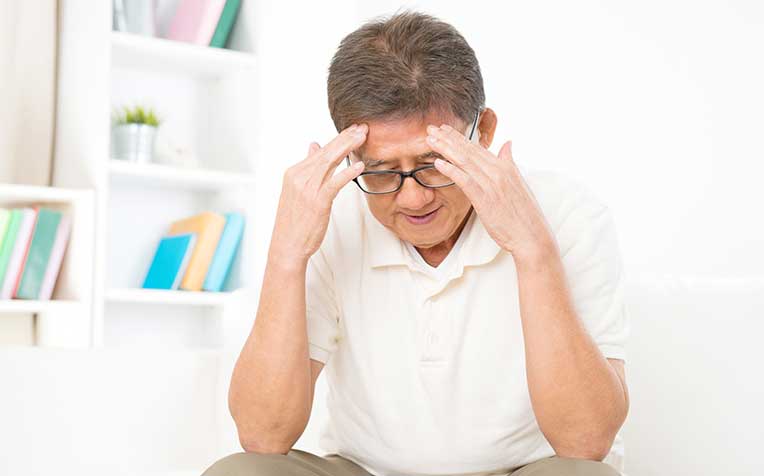
Use the 15/15 rule to treat low blood glucose (hypoglycemia).
If you have diabetes, you don’t just have to watch out for high blood sugar. You must watch out for low blood sugar (Hypoglycaemia) as well.
"Symptoms of low blood sugar (hypoglycemia) are unpleasant and may interfere with your daily activities. Serious hypoglycaemia may cause accidents, seizures, coma and death. Fortunately, there are ways to recognise, treat, and prevent hypoglycemia," says Dr Amanda Lam, Consultant at the Department of Endocrinology, Singapore General Hospital (SGH), a member of the SingHealth group.
How to treat low blood glucose using the 15/15 rule
Step 1:
If you experience symptoms of hypoglycemia, check your blood glucose using your glucometer. If your blood glucose is < 4.0 mmol/L, eat or drink 15 g of fast-acting carbohydrates immediately.
Examples of fast-acting carbohydrates include:
![]() 4-5 glucose tablets, or
4-5 glucose tablets, or
![]() 1/2 can of soft drink (150ml-200ml), or
1/2 can of soft drink (150ml-200ml), or
![]() 1/2 glass of fruit juice (150ml), or
1/2 glass of fruit juice (150ml), or
![]() 3 teaspoons sugar with half cup water
3 teaspoons sugar with half cup water
If you have symptoms of low blood glucose, but cannot check your blood glucose immediately, eat or drink 15g of fast-acting carbohydrates to be safe.
Avoid using these types of foods to treat low blood glucose, as it will take too long to increase your blood glucose levels:
![]() Any food or drink containing fat or protein
Any food or drink containing fat or protein
![]() Any item that requires a lot of prolonged chewing/sucking
Any item that requires a lot of prolonged chewing/sucking
Step 2:
Wait for 15 minutes, and then re-test your blood glucose.
![]()
Step 3:
If your blood glucose is still low (< 4.0 mmol/L), repeat steps 1 to 3. If your blood glucose is 4.0 mmol/L and above, proceed to step 4.
Step 4:
Blood glucose levels may fall again about 1 hour after you have treated your hypoglycaemia. If your next meal is more than 1 hour away, eat an additional snack containing 15g of longer-acting carbohydrates.
Examples include:
![]() 3 pieces of biscuits, or
3 pieces of biscuits, or
![]() 1 slice of bread
1 slice of bread
Be prepared to deal with hypoglycemia
Monitor your blood glucose levels frequently
Carry quick-acting carbohydrates with you at all times, so that you are always prepared to treat hypoglycemia
"Tell your family and friends what symptoms to look out for and what to do, in case you are not able to treat hypoglycaemia yourself," advises Dr Lam.
If you experience low blood sugar symptoms, immediately stop any physical activity and check your blood sugar level with a blood sugar monitor to confirm that it is low. It is recommended to consume a sugary food or beverage, or over-the-counter glucose tablets immediately to raise your blood sugar level. Do not take your diabetes medication until your blood sugar level is normal.
Tips to prevent hypoglycemia
Take your diabetes medication regularly as recommended by your doctor.
Eat nutritious meals and time them to balance your diabetes medication.
Monitor your blood sugar level regularly based on your doctor’s recommendation.
Adjust your food intake and medication according to your exercise routine.
When should you go to the hospital?
A family member or friend should take you to the hospital or call an ambulance (995) immediately if you:
Continue to have low blood glucose (< 4.0 mmol/L) after repeated treatments with fast-acting carbohydrates
Have a seizure
Are unconscious because of a hypoglycemia episode
What is hypoglycemia?
Hypoglycemia (low blood glucose) happens when blood glucose falls below normal levels. A blood glucose level of < 4.0 mmol/L is considered hypoglycemia. Hypoglycemia may happen to anyone, but is more common with diabetics. This is because of the intake of insulin and certain types of oral diabetes medications.
If you are on treatment for diabetes, hypoglycemia may occur when you:
Take too much insulin, or certain oral glucose-lowering pills
Altering the timings or doses of insulin and other diabetic medication
Do not eat enough food
Wait too long between meals, or skip a meal
Exercise more than usual
Drink excessive alcohol, or drink alcohol without food
If you suspect that you may be having hypoglycemia (low blood glucose), test your blood glucose level using a glucose meter.
Signs and symptoms of hypoglycemia
Early symptoms of hypoglycemia
Early signs and symptoms of hypoglycemia include:
Shakiness
Sweating
Fast heartbeat
Headaches
Dizziness
Tingling sensation in your fingers, lips or tongue
Feeling hungry or nauseous
Feeling nervous or anxious
Feeling irritable
Severe symptoms of hypoglycemia
Severe symptoms can include:
Weakness and difficulty walking
Blurred vision
Confusion and abnormal behaviour
Slurred speech
Loss of consciousness
Seizures
If you have severe symptoms, you or the people around you should call for an ambulance (995) immediately.
Hypoglycemia may happen while you are sleeping. Some clues that you may be experiencing hypoglycemia while asleep include:
Profuse sweating while sleeping
Seizures
Feeling tired or confused, or having a headache after waking up
Share our handy tips with those who might need it. You'll never know if you would end up saving a life someday. Awareness is key!
Ref: J22
Other diabetes articles you may be interested in:
Diabetes Foot Care Tips: 10 Steps to Healthy Feet
Tips for Travelling with Diabetes
Because #healthiswealth#healthforgood
Contributed by

















 Get it on Google Play
Get it on Google Play